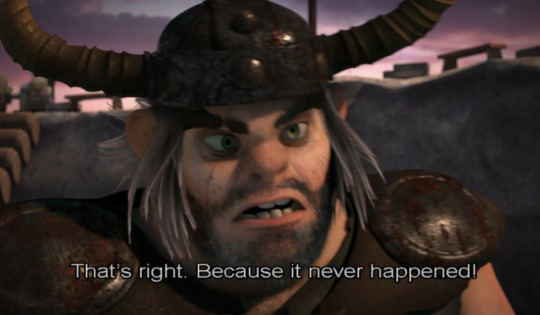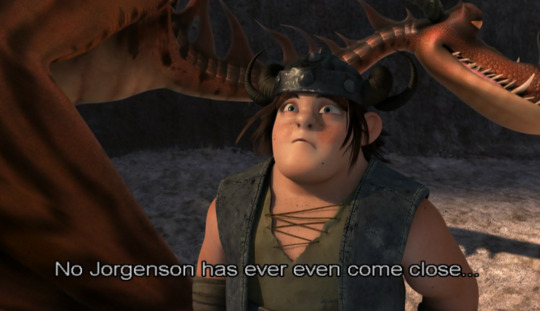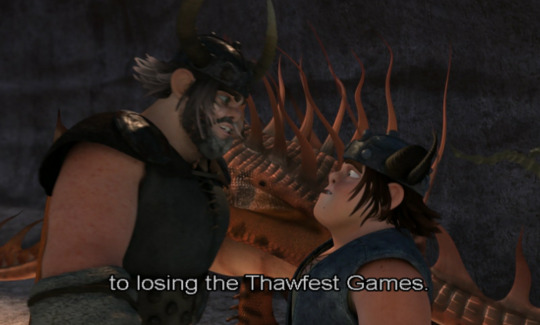#disinheritence
Explore tagged Tumblr posts
Text
What if Snotlout Had Lost the Thawfest Games? (HTTYD Theory)

Well met, my fellow Furians! Welcome to another HTTYD post! Today, we'll be doing another Snotlout post, and today's topic is about something that I've had for a long time but am only now writing about.
What would happen if Hiccup had won? And what would happen if Snotlout had lost the Thawfest Games?
I had watched the "Thawfest" episode multiple times and every time I did, I had always asked myself these two questions.
And, of course, every time I watched this, this scene would pop up:





<><><><><>
Spitelout: Did you ever hear the story of when I almost lost the Thawfest Games?
Snotlout: No. I never did.
Spitelout: That's right. Because IT NEVER HAPPENED!!!
<><><><><>



<><><><><>
Spitelout: No Jorgenson has ever come close to losing the Thawfest Games. Don't you be the first.
<><><><><>
This scene was interesting. Not only does it reek of fanatic Sports Dad vibes, but he's also threatening Snotlout and demanding that he comes out on top.
Personally, I highly doubt that the Jorgensons have won EVERY SINGLE Thawfest Games in Berk's history. I suspect this is just a myth stated in Spitelout's delusional grandeur to spur Snotlout into winning the games. What I DO believe, however, is that Spitelout has won every Thawfest Game in HIS youth, as Snotlout has. Maybe even their grandfather??? I don't know. We know next to nothing about Berkian history, so it's all speculation and headcanons for us weebs. 🤓😢
Needless to say, Snotlout is under a lot of pressure, and Spitelout is in a stormy mood at the moment. And his threat to his son seemed to imply that, should Snotlout lose, all Helheim would break loose.
Now, what would this entail?
Well, if you want to keep it PG-13: grounding, spanking, taking his favorite weapons, throwing all his medals in the trash... anything petty that I can see Spitelout doing.
If you want it dark and edgy: abuse, disinheritance, or even disownment.
Now, you're probably thinking, what's the difference between being disinherited and disowned? Simple: being disinherited means losing your piece of the pie in the family's wealth. And since Snotlout was the only son, he'd get the lion's share of it as the next Head of the family. Being disowned means the complete severing of familial ties and Snotlout would no longer be a Jorgenson and wouldn't have a family cell to support him; he'd be left to his own devices. In Viking society, that is a BIG deal.
Now, would Spitelout even go as far as to disinherit or even disown his own son? Mmm... unlikely. As far as we know, Snotlout is the only male in Spitelout's core family, so unless Spitelout hands the heir title over to a relative, it's doubtful that Spitelout would even do such a thing even if he were super furious. Plus, I also doubt that Snotlout's mother would allow Spitelout to go that far.
So honestly, abuse would be the more likely outcome, and could explain Snotlout looking to be in utter terror in this next scene:


<><><><><>
Snotlout: [Whimpers] I can't lose. I can't lose. I can't lose, I can't lose!
<><><><><>
Of course, I could very well be wrong and Spitelout WOULD disinherit or disown his son. We just don't know since that event never happened and Hiccup stupidly gave up his winning spot for the idiot.
Now, here's my headcanon.
My Headcanon
Snotlout loses the Thawfest Games, and Hiccup becomes the winner, being the first person in decades who's not a Jorgenson to win the Thawfest Medal.
Snotlout is then left to deal with the thundering storm that is his father, Spitelout, who storms off back to their Hall. When evening falls, Snotlout deals with Spitelout's curses, tirades, and physical and verbal abuse.
Hookfang, seeing that his master is being harmed by his father comes to the rescue and attacks Spitelout, either injuring him or even killing him.
Because of this incident, Snotlout is forced to leave Berk in exile with Hookfang until things can be settled. Which kinda fits the theme of the "Cast Out" episodes in Defenders of Berk.

Conclusion
So yeah, that's my theory and headcanon. What do you guys think? Think any of this is possible? Or do you have your own theories and headcanons? Please share! I can't wait to see what you guys come up with! 😀
Thanks for reading this and I hope you have a marvelous Wednesday!
Long Live the Night!
— Noctus Fury
#noctusfury#httyd#httyd articles#httyd theories#httyd headcanons#snotlout jorgenson#snotlout#dreamworks dragons#spitelout jorgenson#spitelout#riders of berk#thawfest#thawfest games#httyd franchise#httyd spitelout#httyd snotlout#hookfang#httyd hookfang#exile#banishment#outlawry#outcast#jorgenson family#family drama#disownment#disinheritence#losing#loser humiliation#self-exile#cast out
47 notes
·
View notes
Text
"I'm gonna make him an offer he can't refuse"


#the godfather#mafia#f1#fernando alonso#lawrence stroll#lance has been officially disinherited#formula 1#formula one#f1 memes#formula 1 memes#formula one memes
465 notes
·
View notes
Text
Saw someone say the red bat on Jason's chest looked like a brand and I can't stop thinking about that, I think it should actually be. That thing's got metal, right? Heat it or burn it or something and make it a bat-shaped brand into his chest. I think it would be fun. It's the unfairness of it all. Your father can disown you but you cannot disown him. You put the branding iron on yourself. There's no escaping being your father's son.
#something something that scene in Gotham War where he's trapped in the housefire because of the brainwashing#what if some burning beam fell on him or something#ik that's probably not how their suits work but like#wouldn't that be so on theme#to be clear this is about jason todd#YOU can absolutely disinherit your father if you choose to#he just needs like intense therapy#dc#jason todd#dc comics#red hood
173 notes
·
View notes
Text
I think what really hits this chapter about Zanka is the fact that it solidifies that he was THE black sheep of the family.
Like, the whole flashback of his wanting to be seen as a genius becomes more heartbreaking because he's a painfully average teen in a family of Cop and FBI Prodigies. His dad's the mayor/owner of his hometown, his mom is essentially the big boss, his sister and brother are both heads of the terrorist crackdown group.
And Zanka is just a teen who wants to fit in his own family by being exceptional.
No wonder he's so attached to Enjin and his Average Joe namesake, it's probably the first time an adult made him feel okay about not being exceptional or special.
And hearing that he got DISINHERITED??? DISOWNED EVEN??? Who suggested this, who allowed this even. Zanka is the family baby, who even let this happen.
Makes you wonder if he's trying to get power because he wants to prove them wrong or because he wants them to accept him.
#gachiakuta#is this gonna be another noelle moment where the siblings are all gonna be shit to the family baby for being behind their peers?#i really REALLY pray its less of that and more of like#them threatening disinheritance if Zanka drops out and joins the cleaners#zanka nijiku#and then Zanka did it and they stuck by it because theyre thinking hed crawl back and want to apologise#and he never fuvken did#mark my words this whole family is probably neurotic like him and Zanka is the only child who decided to move out before ut was too late#gachiakuta spoilers#zanka nijik#silv writes
96 notes
·
View notes
Text
I’ve seen polls before on which of the male leads in Austen novels makes the biggest Dramatic Action, but I’m going to try coming at things from a different perspective. (Not all of these relate to the lead couples, or even the end couples! they’re the relationship-related actions of the male leads that I think it would be hardest to do.)
#jane austen#sense and sensibility#pride and prejudice#mansfield park#emma#persuasion#northanger abbey#no ‘see results’ category - we die like jane austen protagonists don’t#i’m understating the edward ferrars one becayse I ran put of space and could ‘t fit ‘at the cost of disinheritance’#or ‘when you love someone else’
101 notes
·
View notes
Text
the same people capable of clocking that the phrase ‘sharply questioned’ means torture are now the ones suddenly incapable of understanding that being ‘touched’ in the medieval era means penis in vagina sex NOT ‘oh they kissed each other/played with each other uwu’ even if that is still damaging because of how deep chastity culture had rotted into that society; it was not what alicent was asking about in the courtyard.
rhaenyra did *not* lie to alicent when she said that daemon ‘had never touched her’ and regardless she didn’t owe alicent the truth anyway. they had only just -sort of- reconciled earlier in the day and hadn’t been friends for years at this point + alicent came to her extremely aggressive; mocking targaryen customs and making it clear that whatever rhaenyra said in defense of herself she would be ridiculed and shamed *by alicent* in response. it’s why rhaenyra’s initial tune of wariness changed to outright defensiveness.
rhaenyra’s position at court was unstable and she understood that not only was alicent otto’s creature through and through (whether she wanted to be or not) she knew they were actively working to install aegon as heir over her. meaning she made it a priority to save herself from the accusations taking place against her. that is not a bad thing, and it wasn’t used in a malicious way against alicent. please use your brains 🫶
#house of the dragon#rhaenyra targaryen#pro rhaenyra targaryen#team black#anti team green#anti team green stans#the producers obsession with ruining targaryen women and uplifting the actual abusers needs to be studied#a was playing the middle ground once again#trying to appease rhaenyra#all while knowing her father was orchestrating a way to disinherit her#not a smart move on her part#and it backfired spectacularly
191 notes
·
View notes
Text
imagine how op grayson’s and jameson’s college admission essays were. like with their piles and piles of trauma (and last name ☠️) they probably got in without a moments hesitation.
#‘yeah so i was raised to be the stone-cold heir who doesn’t show emotion but i got disinherited. then my gf died then my grandfather who-#raised me died then i got manipulated by my situationship oh and my parents are deadbeats.’ -grayson#‘im constantly seeking validation bc my grandfather never gave me any btw he’s dead and so is my girlfriend who i watched die and who-#juggled her relationship between her and me and her and my brother bc yes i was in a love triangle with my brother twice. -jameson
48 notes
·
View notes
Text
‘100% feminist’: how Eleanor Rathbone invented child benefit – and changed women’s lives for ever
She was an MP and author with a formidable reputation, fighting for the rights of women and refugees, and opposing the appeasement of Hitler. Why isn’t she better known today?
Ladies please reblog to give her the recognition she deserves

By Susanna Rustin Thu 4 Jul 2024
My used copy of the first edition of The Disinherited Family arrives in the post from a secondhand bookseller in Lancashire. A dark blue hardback inscribed with the name of its first owner, Miss M Marshall, and the year of publication, 1924, it cost just £12.99. I am not a collector of old tomes but am thrilled to have this one. It has a case to be considered among the most important feminist economics books ever written.
Its centenary has so far received little, if any, attention. Yet the arguments it sets out are the reason nearly all mothers in the UK receive child benefit from the government. Its author, Eleanor Rathbone, was one of the most influential women in politics in the first half of the 20th century. She led the National Union of Societies for Equal Citizenship (Nusec, the main suffragist organisation, also formerly known as the National Union of Women Suffrage Societies) from 1919, when Millicent Fawcett stood down, until the roughly five million women who were not enfranchised in 1918 gained the vote 10 years later. In 1929, aged 57, she became an MP, and remained in parliament until her death in 1946. While there, she built up a formidable reputation based on her advocacy for women’s rights, welfare reform and the rights of refugees, and her opposition to the appeasement of Hitler.
It would not be true to say that Eleanor Rathbone has been forgotten. Her portrait by James Gunn hangs in the National Portrait Gallery. Twenty years ago she was the subject of a fine biography and she is remembered at Somerville college, Oxford – where she studied in the 1890s and ran a society called the Associated Prigs. (While the name was a joke, Rathbone did have a priggish side ��� as well as being an original thinker, tremendous campaigner, and stubborn, sensitive personality.) She also features in Rachel Reeves’s book The Women Who Made Modern Economics, although Reeves – who hopes shortly to become the UK’s first female chancellor – pays more attention to her contemporary, Beatrice Webb.

A thrilling tome … The Disinherited Family by Eleanor Rathbone. Photograph: Alicia Canter/The Guardian
But Rathbone, who came from a wealthy dynasty of nonconformist merchants, does not have anything like the name-recognition of the Pankhursts or Millicent Fawcett, or of pioneering politicians including Nancy Astor and Ellen Wilkinson. Nor does she enjoy the cachet of writers such as Virginia Woolf, whose polemic about women’s opportunities, A Room of One’s Own, was published five years after Rathbone’s magnum opus.
There are many reasons for Rathbone’s relative obscurity. One is that she was the first woman elected to parliament as an independent (and one of a handful of men at the time). Thus there is no political party with an interest in turning her into an icon. Having spent the past three years writing a book about the British women’s movement, I am embarrassed to admit that when I started, I didn’t know who she was.
Rathbone was not the first person to propose state benefits paid to mothers. The endowment of motherhood or family allowances, as the policy was known, was written about by the Swedish feminist Ellen Key, and tried out as a project of the Fabian Women’s Group, who published their findings in a pamphlet in 1912. But Rathbone pushed the idea to the forefront. A first attempt to get Nusec to adopt it was knocked back in 1921, and she then spent three years conducting research. The title she gave the book she produced, The Disinherited Family, reflected her view that women and children were being deprived of their rightful share of the country’s wealth.
The problem, as she saw it, was one of distribution. While the wage system in industrialised countries treated all workers on a given pay grade the same, some households needed more money than others. While unions argued for higher wages across the board, Rathbone believed the state should supplement the incomes of larger families. She opened the book with an archly phrased rhetorical question: “Whether there is any subject in the world of equal importance that has received so little consideration as the economic status of the family?” She went on to accuse economists of behaving as if they were “self-propagating bachelors” – so little did the lives of mothers appear to interest them.
Rathbone’s twin aims were to end wives’ dependence on husbands and reward their domestic labour. Family allowances paid directly to them could either be spent on housekeeping or childcare, enabling them to go out to work. Ellen Wilkinson, the radical Labour MP for Middlesbrough (and future minister for education), was among early supporters. William Beveridge read the book when he was director of the London School of Economics, declared himself a convert and introduced one of the first schemes of family-linked payments for his staff.
But others were strongly opposed. Conservative objections to such a radical expansion of the state were predictable. But they were echoed by liberal feminists including Millicent Fawcett, who called the plan “a step in the direction of practical socialism”. Trade unions preferred to push for a living wage, while some male MPs thought the policy undermined the role of men as breadwinners. Labour and the Trades Union Congress (TUC) finally swung behind family allowances in 1942. As the war drew to a close, Rathbone led a backbench rebellion against ministers who wanted to pay the benefit to fathers instead.

Rathbone celebrates the Silver Jubilee of the Women’s Vote in London, 20 February 1943. Photograph: Picture Post/Getty Images
It is for this signature policy that she is most often remembered today. At a time when hundreds of thousands of children have been pushed into poverty by the two-child limit on benefit payments, Rathbone’s advocacy on behalf of larger families could hardly be more relevant. The limit, devised by George Osborne, applies to universal and child tax credits – and not child benefit itself. But Rishi Sunak’s government announced changes to the latter in this year’s budget. From 2026, eligibility will be assessed on a household rather than individual basis. This is intended to limit payments to better-off, dual-income families. But the UK Women’s Budget Group and others have objected on grounds that child benefit should retain its original purpose of directly remunerating primary carers (the vast majority of them mothers) for the work of rearing children. It remains to be seen whether this plan will be carried through by the next government.
Rathbone once told the House of Commons she was “100% feminist”, and few MPs have been as single-minded in their commitment to women’s causes. As president of Nusec (the law-abiding wing of the suffrage campaign), she played a vital role in finishing the job of winning votes for women.
The last few years have seen a resurgence of interest in women’s suffrage, partly due to the centenary of the first women’s suffrage act. Thanks to a brilliant campaign by Caroline Criado Perez, a statue of Millicent Fawcett, the nonmilitant suffragist leader, now stands in Westminster, a few minutes walk from the bronze memorial of Emmeline Pankhurst erected in 1930. Suffragette direct action has long been a source of fascination. What is less well known is that militants played little part in the movement after 1918. It was law-abiding constitutionalists – suffragists rather than suffragettes – who pushed through the 1920s to win votes for the younger and poorer women who did not yet have them. Rathbone helped lead this final phase of the campaign, along with Conservative MP Nancy Astor and others.
Rathbone was highly critical of the militants, and once claimed that they “came within an inch of wrecking the suffrage movement, perhaps for a generation”. Today, with climate groups including Just Stop Oil copying the suffragette tactic of vandalising paintings, it is worth remembering that many women’s suffrage campaigners opposed such methods.
Schismatic though it was, the suffrage movement at least had a shared goal. An even greater challenge for feminists in the 1920s was agreeing on future priorities. Equal pay, parental rights and an end to the sexual double standard were among demands that had broad support. After the arrival in the House of Commons of the first female MPs, legislative successes included the removal of the bar on women’s entry to the professions, new rights for mothers and widows’ pensions. But there were also fierce disagreements.
Tensions between class and sexual politics were longstanding, with some on the left regarding feminism as a distraction. The Labour MP Marion Phillips, for example, thought membership of single-sex groups placed women “in danger of getting their political opinions muddled”. There was also renewed conflict over protective legislation – the name given to employment laws that differentiated between men and women. While such measures included maternity leave and safety rules for pregnant women, many feminists believed their true purpose was to keep jobs for men – and prevent female workers from competing.
Underlying such arguments was the question of whether women, once enfranchised, should strive for equal treatment, or push for measures designed to address their specific needs. As the debate grew more heated, partisans on either side gave themselves the labels of “old” and “new” feminists. While the former, also called equalitarians, wanted to focus on the obstacles that prevented women from participating in public life on the same terms as men, the new feminists led by Rathbone sought to pioneer an innovative, woman-centred politics. Since this brought to the fore issues such as reproductive health and mothers’ poverty, it is known as “maternalist feminism”.

Rathbone and other Liverpool suffragettes campaigning in 1910. Photograph: Shawshots/Alamy
The faultline extended beyond Britain. But Rathbone and her foes had some of the angriest clashes. At one international convention, Lady Rhondda, a wealthy former suffragette, used a speech to deride rivals who chose to “putter away” at welfare work, instead of the issues she considered important.
The specific policy points at issue have, of course, changed over the past century. But arguments about how much emphasis feminists should place on biological differences between men and women carry on.
Eleanor Rathbone did not live long enough to see the welfare state, including child benefit paid to mothers, take root in postwar Britain. Her election to parliament coincided with the Depression, and the lengthening shadows of fascism and nazism meant that she, like her colleagues, became preoccupied with foreign affairs. In the general election of 1935, the number of female MPs fell from 15 to nine, meaning Rathbone’s was one of just a handful of women’s voices. She used hers to oppose the policy of appeasement, and support the rights of refugees, including those escaping Franco’s Spain. During the war she helped run an extra-parliamentary “woman-power committee”, which advocated for female workers.
She also became a supporter of Indian women’s rights, though her liberal imperialism led to tensions with Indian feminists. During the war she angered India’s most eminent writer, Rabindranath Tagore, and its future prime minister, Jawaharlal Nehru, when she attacked the Congress party’s policy of noncooperation with Britain’s war effort. Tagore criticised what he called the “sheer insolent self-complacency” of her demand that the anti-colonial struggle should be set aside while Britain fought Germany.
Rathbone turned down a damehood. After their first shared house in Westminster was bombed, she and her life partner, the Scottish social worker Elizabeth Macadam, moved around the corner to a flat on Tufton Street (Macadam destroyed their letters, meaning that Rathbone’s intimate life remains obscure, but historians believe the relationship was platonic). From there they moved to a larger, quieter house in Highgate. On 2 January 1946, Rathbone suddenly died.

Rathbone’s blue plaque at Tufton Court. Photograph: PjrPlaques/Alamy
A blue plaque on Tufton Street commemorates her as the “pioneer of family allowances” – providing an alternative claim on posterity for an address more commonly associated with the Brexit campaign, since a house a few doors down became its headquarters. She is remembered, too, in Liverpool, where her experience of dispersing welfare to desperately poor soldiers’ wives in the first world war changed the course of her life, and where one of her former homes is being restored by the university.
I don’t believe in ghosts. But walking in Westminster recently, I imagined her hastening across St James’s Park to one of her meetings at Nancy Astor’s house near the London Library. Today, suffragettes are celebrated for their innovative direct action. But Rathbone blazed a trail, too, with her dedication as a campaigner, writer, lobbyist and “100% feminist” parliamentarian.
Sexed: A History of British Feminism by Susanna Rustin is published by Polity Press (£20). To support the Guardian order your copy at guardianbookshop.com. Delivery charges may apply
#Eleanor Rathbone#The Disinherited Family#Books by women#Books about women#Child benefit#National Union of Societies for Equal Citizenship (Nusec)#Rachel Reeve#The Women Who Made Modern Economics#Women in politics#UK#Seed: A History of British Feminism#Susan Rustin
93 notes
·
View notes
Text
I long for a gilded banquet au about Fang Xin going to the banquet on time and fighting the Xian Le extremists and being outed as the fallen crown prince.
#I don’t think it would really fix anything per se?? but it would be satisfying??#the ✨drama✨ the ✨ANGST✨#an le: the people of Xianle deserve justice#xie lian: they deserve peace you asshole and you’re disinherited#mxtx hell#mxtx fandom#xie lian#xie lian heaven official’s blessing#xie lian tgcf#tgcf xie lian#mxtx tgcf#tgcf#tgcf donghua#tgcf novel#tgcf spoilers#tgcf season 2#tian guan ci fu#heaven official's blessing#heaven officials blessing#xianle#crown prince of xianle
29 notes
·
View notes
Text
thinking about that non-bender zuko gets adopted by June AU again and just... spinning the idea of him actually not being Ozai's son and actually is Ikem's son. Ursa was already pregnant with him when Azulon arranged her marriage to Ozai. She wasn't very far along, and the marriage happened so quickly that she was able to pass him off as Ozai's
Azulon still demands Ozai kill his first born child. Ursa still pleads with Ozai to spare Zuko's life, in exchange for getting him what he wants- the throne. But instead of fleeing the palace on her own, she tries to escape with Zuko. And Ozai has always kind of suspected that Zuko wasn't his- and he just takes this as proof. I don't think Ursa gets out of this AU alive.
(Zuko wasn't supposed to either, but for once in his life, he got lucky.)
#bounty hunter zuko au#there's never any public announcement#ursa and zuko were killed in the night by rebels. it's suspected those same rebels killed azulon as well#zuko's never officially disinherited because that would mean admitting that he was tricked. and ozai would never admit that#azula still grows up with the whispers that zuko was only ever her half-brother#(no wonder mother loved him more)
37 notes
·
View notes
Text
Gonna see my horrible dad who sucks in less than an hour WISH ME LUCK
15 notes
·
View notes
Text
Could it be that Lily had been disowned for rejecting marriage offers and choosing to become the nanny of a dancer's daughter? Lilian York was a nobleman's daughter who attended royal banquets and balls before, but after she started working in the Ruby Palace she was never invited to another event again. Not to Athy's debutante ball, not the founding day of Obelia, the Emperor's birthday and not even Athy's coronation. Before Athy won Claude over, the Ruby Palace could not afford more staff and the building deteroriated. They had to ration luxury goods like chocolate. Had Lily still been a noblewoman, she could have bought experienced staff in child raising from home and workers who could do maintenence and repair of the Ruby Palace. She would have used her money to order lp Athy a debutante dress fitting for a princess. Athy was like a daughter to her that's why it's so strange they lived in "proverty" (from the pov of royals).
#Lily being disinherited because she was a lesbian or asexual and petitioning for her title to support Athy would make an interesting subplot#wmmap#who made me a princess#sbapod#suddenly became a princess one day#lilian york
19 notes
·
View notes
Text
Ludwig: Remember when you said you loved me?
Gilbert: Yeeeees? … Where is this going?
Ludwig: Well… Would you— Would you still love me if I was Roman Catholic?
Gilbert:

14 notes
·
View notes
Text
Rereading Fire and Blood and discovering it was Aegon the Conqueror who agreed to the Maegor/Ceryse Hightower match

#aegon the conqueror#house of the dragon#if the tiktok team black ppl get a hold of this theyll be in shambles#interesting that he never seemed to want to arrange the suggested Rhaena/Maegor match#was he subtly trying to disinherit maegor? 🤨#the dance of the dragons
22 notes
·
View notes
Text
I listened to that super weird and super sweet Interview With The Vampire Ambassador Sarek that Gene Roddenberry did with Sarek's original actor Mark Lenard.
In disco they show Michael Burnham surviving the terrorist attack on Vulcan and then Sarek shows up, sees Michael dying and goes and puts his katra in this poor kid.
Anyway I just know Amanda was screaming at his ass through the bond to keep her daughter alive.
#star trek#disco#michael burnham#ambassador sarek#amanda grayson#sarek loves his kids and amanda and i will die on this hill#but he disinherited spock for joining starfleet#yeah hes a got a flair for the dramatic we see that in spock#his grandfather literally vulcan kissed cochrane at first contact#theres never been a normal heir to surak
13 notes
·
View notes
Text
i wonder if claire was Actually disinherited by her father or if he just told her That and to not get in contact him ever again she just Believed him.
#i wonder because i keep thinking about the bureaucratic process of disinheriting claire. and since we're talking about rich people#she would actually be losing an inheritance and it's not just words lmaoo. claire tells hunt she's a heiress and she's not lying!!#part of me thinks he probably just Said that Expecting her to believe it. and she did.#<- and he said it hoping claire would like. come back. one day. he's still waiting i guess
4 notes
·
View notes